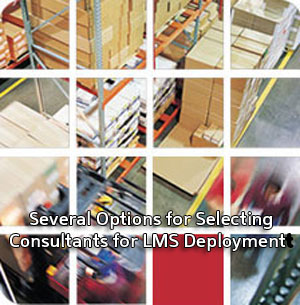Select the software you want to use, and separately select the consultant for the standards and related work.
Advantages: May ensure better fit of consulting capabilities and style to your needs. More easy to change out consultants if not happy with the results. May be somewhat lower in terms of services costs.
Disadvantages: Can possibly have some finger pointing between consultants and software vendors. May be difficult to use consultants to help you find the best solution as part of the selection process (see below). Consultants may not well understand the software.
 First, select a consultant to help select the LMS software package, then use that consultant on the LMS implementation. First, select a consultant to help select the LMS software package, then use that consultant on the LMS implementation.
Advantages: Gets some outside expertise in selecting the software that is more difficult to do when using either of the first two approaches. Selection process should help the consultant become very familiar with the selected vendor’s software before implementation.
Disadvantages: Can have the effect of locking in the consultant for the selection to be the one to assist with the LMS implementation; that may result in less leverage for project costs than with selecting a consultant for the implementation only.
In theory, of course, a company could use one consultant to help it select the LMS software, then open the implementation back up for selection among several consultants, but that, in practice, is not often done, especially in LMS software (it is more common in some other areas of software, such as ERP).
Another consideration is that many companies may not be aware of the dynamics depending on how the “opportunity” develops. An LMS software company with consulting capabilities may fight very hard to also get the engineering work if it “finds” the deal. However, if the opportunity is developed by a consultant, which then calls an LMS software company in, there is usually an understanding that the software company will defer to the consultant for the engineering work.
Do we have you confused yet?
One important thing for a company to consider is its interest in becoming nearly or completely self-sufficient over time. Many companies, especially those with some reasonable level of industrial engineering support, want to be able over time to develop and maintain their own standards and methods. In a large DC network, a typical approach may be to largely observe at the first DC, assist at the second DC, and take on full responsibility at the third. Consultant companies may differ in their approach to such “knowledge transfer.”
Other companies, however, lack the bandwidth or interest in taking that work on.
Regardless, the key is to find engineers that can build really good standards and develop the right relationship with the client, says John Pearce, a consultant at Cornerstone Solutions.
“Any of the three options you describe can work,” Pearce says. “But you do want to make sure you are getting someone who can build a really good standard and do so independent of what the software can do,” he added.
What should be considered in which type of approach a company takes to select a consulting company for LMS implementation and standards development? Is there a “best way?” Let us know your thoughts at the Feedback button below.
|